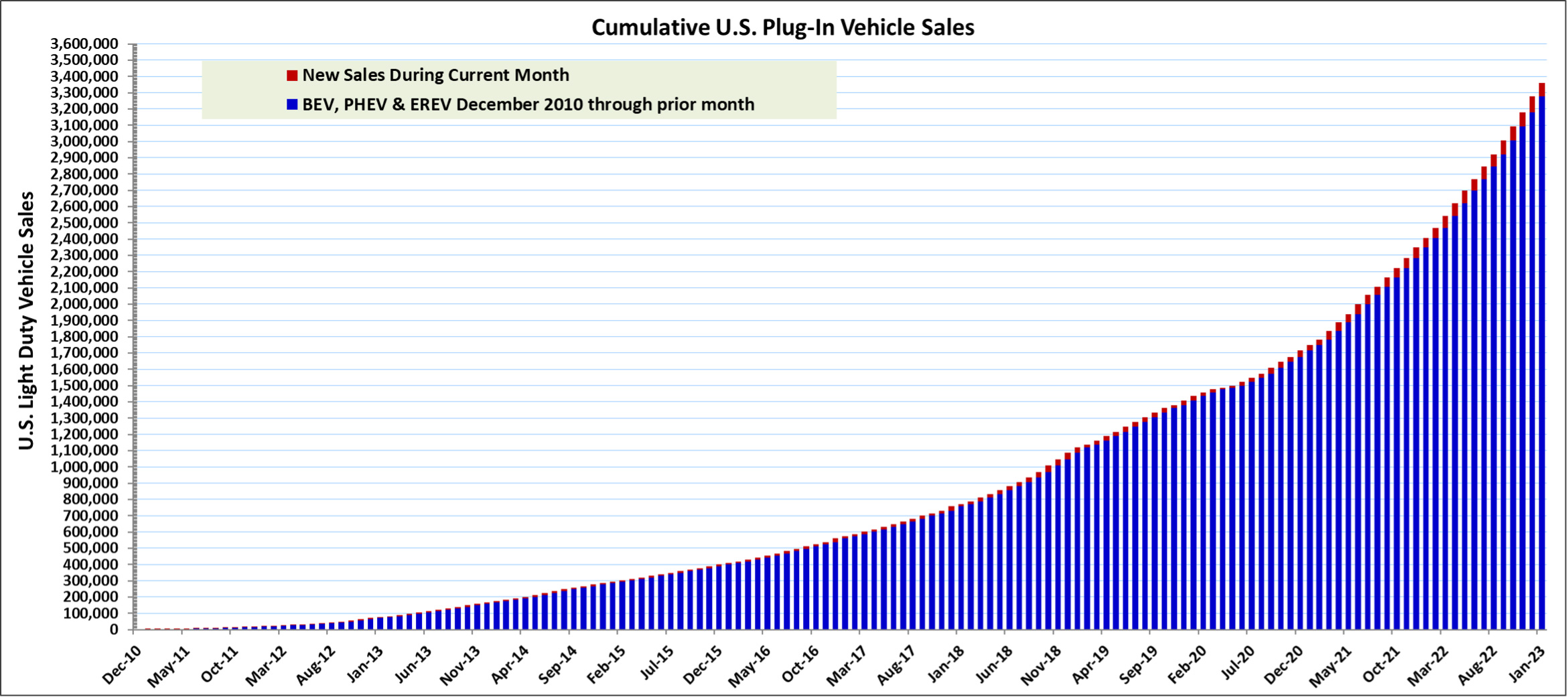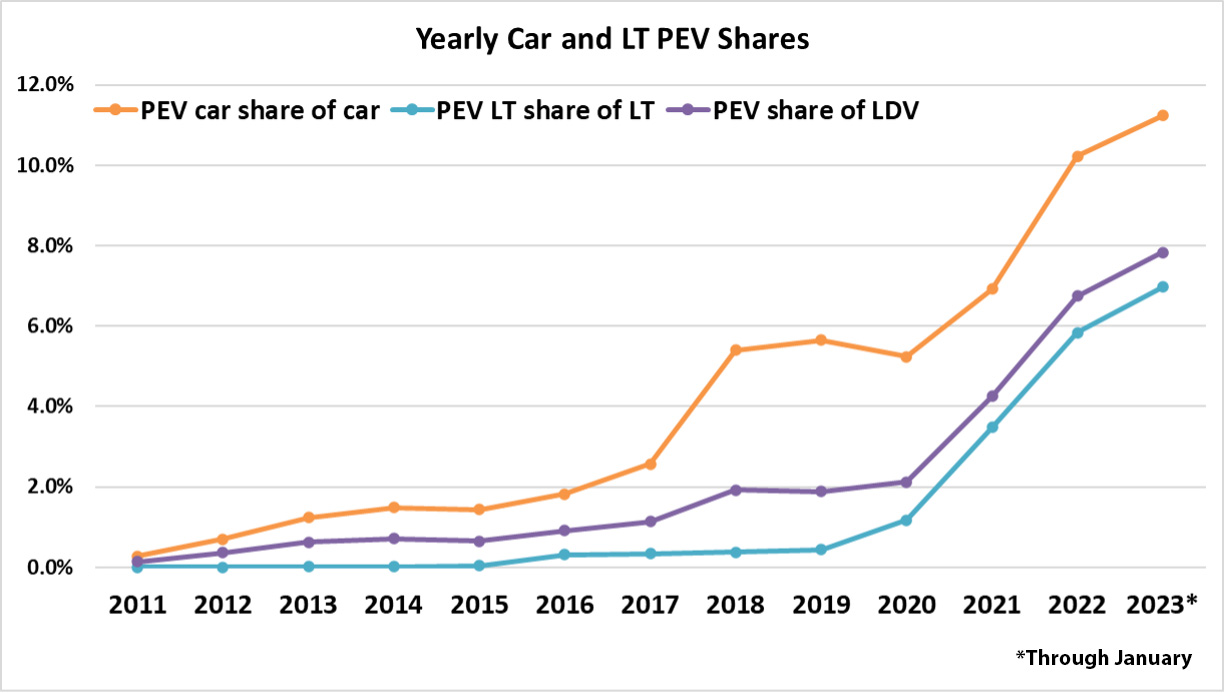Electric vehicles (EVs) are in the news seemingly every day. Between price drops, safety recalls, trade wars, bombastic executives, and a variety of other issues, EVs are constantly in the public eye.


Plug-in vehicles are outpacing hybrids despite being more expensive
In January 2023, 59,137 HEVs (10,813 cars and 48,324 light trucks) were sold in the United States, compared to 80,859 plug-in vehicles (66,416 BEVs and 14,443 PHEVs). HEV sales were down 6% from January 2022, while HEV sales were up an astonishing 48%.
This is especially impressive considering the typical prices of PEVs. According to Kelley Blue Book, the average transaction price for a new non-luxury vehicle in December 2022 was $45,578, while the average for a new electric vehicle was $61,448.
That means the average new EV is almost $16,000 more than the average non-electric vehicle. And that includes trucks and SUVs (which make up about 75% of the car market in the U.S.), so the average increase over a comparable non-electric car is probably significantly more.
New hybrids, however, are much closer in price to their non-electrified equivalents. In September 2022, Kelley Blue Book reported the following averages:
- New compact car: $26,296
- New mid-size car: $32,266
- New hybrid car: $32,944
Plug-in vehicles now make up almost 12% of the car market
ANL's monthly reporting shows that PEVs have made up almost 12% of the car market so far in 2023. If trends continue, this number could be much higher within the next five years:

When it comes to BEVs, though, the story is different. According to a Cox Automotive report, Tesla sold an incredible 64.5% of the EVs bought in the United States in 2022 (that's a total of 522,388 vehicles). Ford came in a distant second with 7.6% (61,575 vehicles sold).
What do consumers think of electric vehicles?
If we're talking about the future of the electric vehicle industry, we need to talk about consumer outlook. Many car manufacturers are committing to significant or even full electrification of their product suite, but how do consumers feel about it?
In a January 2023 survey, The Motley Fool asked 2,000 American citizens whether they owned a hybrid or fully electric vehicle. Only 20% said yes:
Do you currently own a hybrid or electric vehicle? | Percentage of respondents |
|---|---|
No | 80% |
Yes, a non-plug-in hybrid | 7% |
Yes, a plug-in hybrid | 7% |
Yes, a fully electric vehicle | 6% |
However, 57% of our respondents also said they're at least somewhat likely to buy a hybrid or electric car or truck for their next vehicle.
How likely are you to buy a hybrid or electric car/truck for your next vehicle? | Percentage of respondents |
|---|---|
Very likely | 23% |
Somewhat likely | 34% |
Somewhat unlikely | 18% |
Very unlikely | 25% |
Consumer divisions on electric vehicles largely fall along political party lines
As with the results of our survey on renewable energy investing, our respondents were split along party lines when it came to electric vehicles.
For example, when asked about how likely they are to buy a hybrid or electric vehicle car or truck for their next vehicle, about 66% of Democrat-leaning respondents were at least somewhat likely, while about 50% of Republican-leaning respondents said the same.
Similarly, when we asked those who were very unlikely to buy an EV why that was the case, most people said that they're too expensive. This was also true of left-leaning respondents. But those who tend to vote Republican were most likely to say that they'd rather drive a gas vehicle (this is also true of male respondents, regardless of political affiliation).
Consumers oppose legislation phasing out the sale of gas-powered vehicles
Another party split is obvious when it comes to states passing legislation that requires the phasing out of gas-powered vehicles.
Should state governments pass legislation to phase out the sale of gas-powered vehicles? | Percentage of respondents |
|---|---|
No | 65.35% |
Yes | 34.65% |
The Biden White House has set a national goal for 50% of all vehicles sold to be electric by 2030. A recent piece of legislation also earmarked $7.5 billion to build a national network of 500,000 charging stations (at the time of this writing the Alternative Fuels Data Center reports 51,000 locations and 133,000 ports).
Globally, other countries are following suit. Both Canada and the United Kingdom have made moves to ensure that all cars sold will be electric by 2035. China has required manufacturers to sell 40% EVs by 2030.
And at the United Nations' Climate Change Conference in 2021, 100 stakeholders, including governments, auto manufacturers, investors, and others signed a declaration to hasten the electrification of the entire global auto market to 100% by 2040.
The future of electric vehicles looks good for consumers and investors
A constellation of factors paint a bright picture for the future of electric vehicles.
Consumers want them. Falling prices of battery production will make them more easily available to those who find them too expensive. Manufacturers are committed to increasing production -- including some, like Volvo, even planning on becoming electric-only. And governments are passing legislation to support this process.
This is all good news for investors in the auto industry, consumers and advocates of the environment. However, it's worth noting that the production process of battery-powered vehicles is still quite problematic and its cost largely falls on developing countries. For a very detailed look at the battery production process as well as its environmental and economic costs, see this special issue from the United Nations Conference on Trade and Development.
However, as we've seen with GM, just because an EV shift is planned doesn't mean it happens on time. So we'll continue watching the trends in the hybrid and electric vehicle industry to see if lofty goals are translated into reality.
Sources
- Alternative Fuels Data Center (2023). "Alternative Fueling Station Counts by State."
- Carlier, Mathilde (2022). Statista. "Hybrid and plug-in hybrid electric vehicle sales in the United States from Q1 2020 to Q3 2022, by leading brand."
- Igleheart, Austin (2022). National Conference of State Legislatures. "State Policies Promoting Hybrid and Electric Vehicles."
- International Energy Agency (2022). "Global EV Outlook 2022."
- Kelley Blue Book (2022). "New-Vehicle Prices Increase for Fifth Straight Month, Set Record Again in August, According to Kelley Blue Book."
- Kelley Blue Book (2023). "Electric Vehicle Sales Report: Q4 2022."
- Kelley Blue Book (2023). "No End in Sight: New-Vehicle Transaction Prices End 2022 at Record Highs, According to New Data from Kelley Blue Book."
- Paoli, Leonardo (2022). International Energy Agency. "Electric vehicles: technology deep dive."
- U.N. Conference on Trade and Development (2020). "Developing countries pay environmental cost of electric car batteries."
- U.S. Department of Transportation (2022). "Electric Vehicle Types."
Methodology
The Motley Fool distributed this survey to 2,000 U.S. adults via Pollfish on Jan. 24, 2023.
Respondents were 57% female and 43% male. Age breakdowns were approximately 11% ages 18 to 24, 23% ages 25 to 34, 28% ages 35 to 44, 19% ages 45 to 54, and 18% older than 54. 40% of respondents reported generally voting for Democrats, 30% for Republicans, and 30% for independent/other.